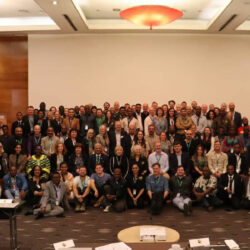Cheetah Conservation Fund Celebrates 7th International Cheetah Day
-

- by CCF Staff November 27, 2017
FOR IMMEDIATE RELEASE
Cheetah Conservation Fund
P.O. Box 1755
Otjiwarongo, Namibia
phone: +264 (0)67-306225
fax: +264 (0)67-306247
ccfinfo@iway.na
CONTACT:
Dr. Laurie Marker, director@cheetah.org (0) 67 306225 or (0) 811247887
Nadja Le Roux, nadja@cheetah.org (0) 67 306225 or (0) 818325764
CHEETAH CONSERVATION FUND CELEBRATES 7TH INTERNATIONAL CHEETAH DAY
OTJIWARONGO, NAMIBIA (Nov. 27, 2017) — Cheetah Conservation Fund (CCF) will lead the 7th annual celebration of International Cheetah Day with special activities at its Centre in Otjiwarongo this weekend. On both Saturday, 3 December, and Sunday, 4 December (International Cheetah Day), the admission fee is waived for Namibians, presenting the ideal opportunity for families to tour the world-renown facilities and observe cheetah feedings free of charge.
To enhance the experience, CCF will offer a variety of educational and interactive activities beginning at 11 a.m. each day. Information booths will be set up at various places around the Centre displaying tools such as camera traps and satellite collars that CCF Ecologists use in their work, with staff members available to explain their use. Visitors can meet some of CCF’s Livestock Guarding Dogs at another exhibit or learn about the process of predator identification, also known as “Kill I.D.”, at another. There will be a crafts table for children where they can make their own cheetah mask. Cheetah feedings will take place at 1200h both days. The Cheetah Café in the Visitor Centre will offer a variety of special treats to help make the occasion a true holiday.
“International Cheetah Day is a wonderful opportunity to learn about the cheetah and to have some fun with the entire family”, said Dr Laurie Marker, Founder and Executive Director of CCF. “The cheetah is a very special animal — the world’s fastest land mammal – and Namibia is a very special place! We are famous for being the ‘Cheetah Capital of the World.’ On 4 December, we honour this amazing big cat, and we hope you will come here and join us”.
The Cheetah Conservation Fund is located 45 km from the town of Otjiwarongo on the D2440 road. CCF facilities are open every day from 8 a.m. to 5 p.m. except 25 December. The Centre hosts community members and school groups from Namibia as well as international tourists and groups from all over the world. For more information, contact: ccfinfo@iway.na or go to www.cheetah.org.
Educational materials, including CCF’s Conservation Passport, Activity Packet, cheetah photos, videos and social media links can be downloaded for free at www.cheetah.org/international-cheetah-day/ or www.internationalcheetahday.org
About CCF
CCF is a Namibian non-profit foundation with the goal of working with farmers on whose land the cheetah lives. CCF has grown over the past 26 years from its inception in 1990 into a world-class research, education and conservation institution that now serves as a model for other carnivore conservation programmes world-wide. CCF has made significant impact on the cheetah conservation crisis.
Some of CCF’s most important achievements include:
- Mitigating the conflict between farmers and cheetahs by introducing innovative, non-lethal predator control strategies, which include the introduction of the livestock guarding dog concept and the advancement of communal and commercial conservancies;
- Stabilising the wild cheetah population in Namibia, and helping it grow from approximately 1,500 in 1990 to more than 2,500 today;
- Training more than 5,000 rural Namibian men and women in agriculture and land management techniques through CCF’s Future Farmers of Africa Programme, to enhance livelihoods and increase understanding of basic conservation principles;
- A successful 20-year history of breeding and placing more than 650 Anatolian shepherd and Kangal livestock guarding dogs with Namibian farmers, and helping launch similar programmes in Botswana, South Africa and Tanzania;
- Impacting more than 450,000 young learners in Namibia through CCF conservation education and outreach programmes;
- Training more than 300 African biologists representing Namibia, South Sudan, Mozambique, Zambia, Algeria, Niger, Benin, Tanzania and Ethiopia in efforts to make species conservation efforts on the continent sustainable over the long term;
- Restoring thousands of hectares of wildlife habitat and farmlands in Namibia by developing an award-winning, biomass fuel product, Bushblok; and
- Creating jobs, driving the eco-tourism industry and generating an estimated 100.3 million NAD annual impact on the country’s economy.
Related Reading


